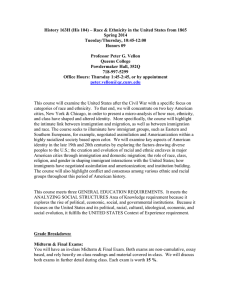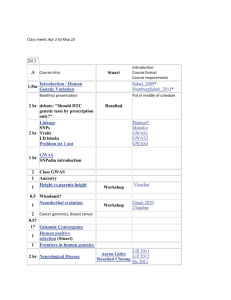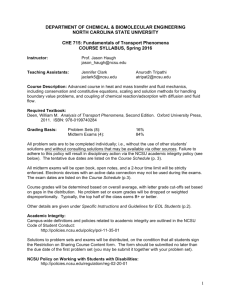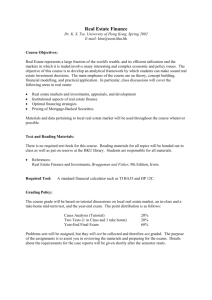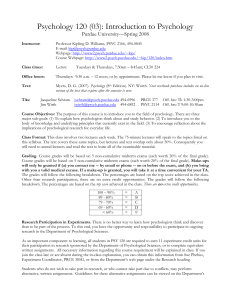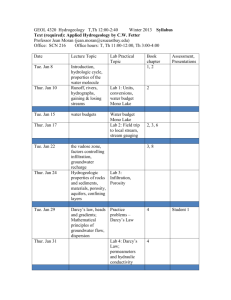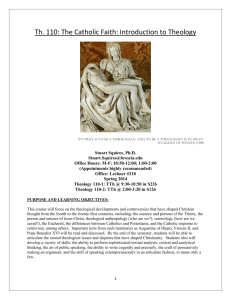History 163H (His 104) – Race & Ethnicity in the United States from
advertisement
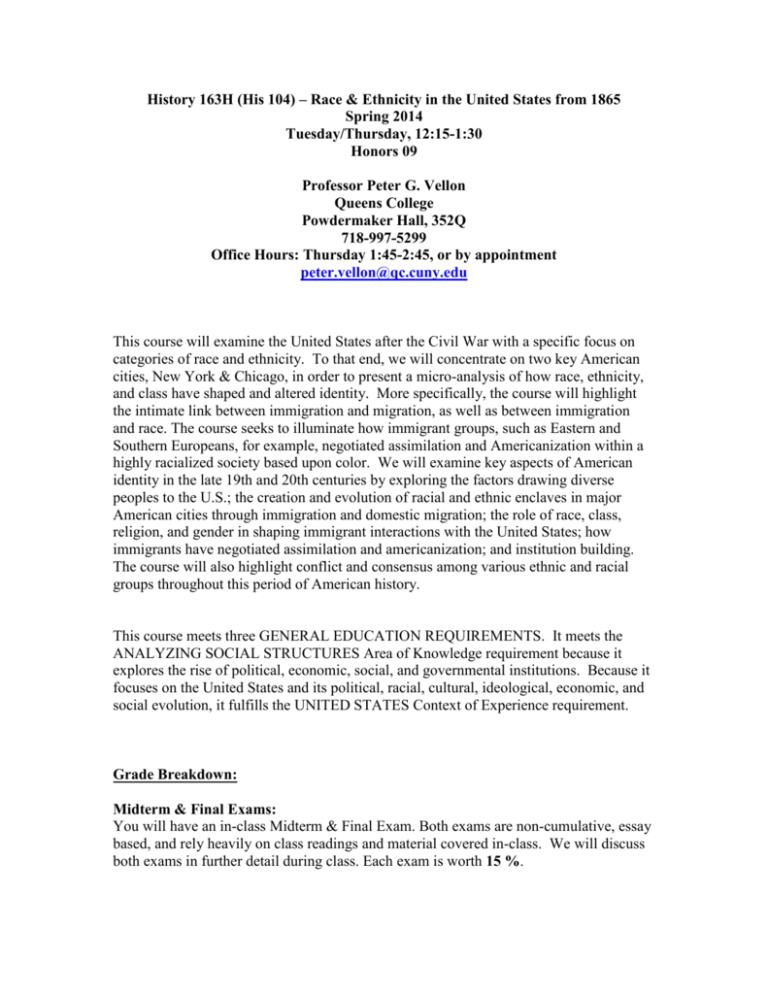
History 163H (His 104) – Race & Ethnicity in the United States from 1865 Spring 2014 Tuesday/Thursday, 12:15-1:30 Honors 09 Professor Peter G. Vellon Queens College Powdermaker Hall, 352Q 718-997-5299 Office Hours: Thursday 1:45-2:45, or by appointment peter.vellon@qc.cuny.edu This course will examine the United States after the Civil War with a specific focus on categories of race and ethnicity. To that end, we will concentrate on two key American cities, New York & Chicago, in order to present a micro-analysis of how race, ethnicity, and class have shaped and altered identity. More specifically, the course will highlight the intimate link between immigration and migration, as well as between immigration and race. The course seeks to illuminate how immigrant groups, such as Eastern and Southern Europeans, for example, negotiated assimilation and Americanization within a highly racialized society based upon color. We will examine key aspects of American identity in the late 19th and 20th centuries by exploring the factors drawing diverse peoples to the U.S.; the creation and evolution of racial and ethnic enclaves in major American cities through immigration and domestic migration; the role of race, class, religion, and gender in shaping immigrant interactions with the United States; how immigrants have negotiated assimilation and americanization; and institution building. The course will also highlight conflict and consensus among various ethnic and racial groups throughout this period of American history. This course meets three GENERAL EDUCATION REQUIREMENTS. It meets the ANALYZING SOCIAL STRUCTURES Area of Knowledge requirement because it explores the rise of political, economic, social, and governmental institutions. Because it focuses on the United States and its political, racial, cultural, ideological, economic, and social evolution, it fulfills the UNITED STATES Context of Experience requirement. Grade Breakdown: Midterm & Final Exams: You will have an in-class Midterm & Final Exam. Both exams are non-cumulative, essay based, and rely heavily on class readings and material covered in-class. We will discuss both exams in further detail during class. Each exam is worth 15 %. Research Paper: You will have the entire semester to complete this assignment. Your Paper Topic must posted on the website by class time on Thursday, February 13th. You will earn 2 points toward your final grade for completing this assignment properly and on time. Your Preliminary Bibliography is due Tuesday, March 25th and is worth 3 pts. These deadlines are for your benefit as a way to encourage [at least I hope so] you not to wait until the last minute to get started on this assignment. Your paper will use SECONDARY and PRIMARY to inform and support your argument or thesis. Your paper must have footnotes or endnotes and should be approximately 10-15 pages in length. We will discuss all of this, including the process of research and writing, in class. See Syllabus for relevant dates and assignment deadlines. (Research Paper is worth 25% (including Paper Topic & Bibliography). Critical Book Review: Students will read both, Native Son by Richard Wright and Christ in Concrete by Pietro DiDonato. Both novels take place in the 1930s and are set in Chicago and New York City respectively. I will distribute questions that will force you to critically analyze and compare some of the major themes in the books, as well as place both books within the larger context of the course. Your essay must be 4 – 6 pages in length, double spaced, and typed. We will discuss this assignment more fully in class. The essay is due on April 10th and is worth 15% of your final grade. On-line Participation Beginning with our class on February 6th, students will post weekly responses to the readings on our course blog. Two students will be assigned to “spark” the discussion by writing 2-3 paragraphs posted online by Sunday at 7:00pm for our Tuesday class or Tuesday at 7:00pm for our Thursday class. You will earn up to 5 points for a wellconstructed spark that does not simply summarize the material, but rather locates major themes and critically analyzes the material. You may also raise questions to the class that problematize the reading. When students are not providing the spark, they must respond once per “reading” week to their colleague. This can be done for either our Tuesday or Thursday class. I will provide a “Spark List” on our class website. 15 % of total grade. In Class Participation: Participation is defined broadly and simply being present in class is not enough. Students must keep up with the weekly readings and come to class prepared to participate in discussions. Consistent, informed, and positive participation will earn students high participation grades. Negative participation, loosely defined as failing to discuss weekly readings, constant text messaging, surfing the internet, dozing off, or engaging in otherwise unproductive activities, will yield a participation grade closer to zero. Students may earn up to 10 % of their final grade with positive participation. Attendance is required in this course and I will take attendance at the beginning of every class. For every absence up to three I will deduct 1 point from your total grade. After three absences, every subsequent absence will cost 2 points. Abusive lateness will also cost you. After your first lateness, every time you arrive over 15 minutes late for class you will lose ½ point. Oral Presentation: Each student will present his or her research findings before the class. The presentation must be 5-7 minutes long and must not be read verbatim from a typed sheet. Instead, students must present the most interesting aspects of their research finding up to that point, their emerging arguments, and examples of supporting evidence. Students can work from notes, but must be mindful that their grade will be computed not only on substance, but oral presentation. All students will present their oral reports on May 13th and May 15th. Worth 5% of final grade. Eportfolio class website: This site will serve as our official meeting place. You will use this website to post blog responses, as well as find materials relevant to the course, such as syllabi, links to primary source material, writing aids, etc., etc. I will also place additional assigned readings (see course schedule), as well as specific assignments, on this website. If you do not have an account set up, you must do so immediately. We will discuss content specifics in class. Students need to go to http://qwriting.org/ and sign up w/ a QC email address and then active their account. Do not click on “creating a website.” You just need an account and then you can start process of accessing the class blog. Once your account is activated you can login and go to the website: http://his163hsection2.qwriting.qc.cuny.edu/ Once there you should click the "ADD ME" button and this should allow you to post blogs, as well as comment on other posts. Required Books: Binder & Reimers, All the Nations Under Heaven: An Ethnic and Racial History of NYC (Columbia Univ. Press, 1995) David Roediger, Working Toward Whiteness: How America’s Immigrants Became White, (Basic Books, 2005) St. Clair Drake, Black Metropolis: A Study of Negro Life in a Northern City (Harcourt, Brace,1945) Richard Wright, Native Son Pietro DoDonato, Christ in Concrete In addition, selected readings have been uploaded to the class website either as pdf files or hyper links to QC’s electronic library. Please be advised that changes to this schedule/additional readings may be made via e-mail or announced in class. If this is necessary I will try to provide as much advance notice as possible. Also, note that the readings are due the day they appear on the syllabus. NOTE to STUDENTS: Although you are free to e-mail me on my Queens College account with course related information or questions, please understand that I may not respond for many days, if at all. Therefore, e-mail is not a preferred method of communication. Rather, if you have questions or need information related to the course, please see me during designated office hours. If that time is not convenient for you we can try to arrange another mutually convenient time. If you cannot attend class and need to let me know, feel free to leave a message on my QC voicemail. Also, if you cannot attend a particular class meeting I urge you to make a friend who can provide you with lecture notes. I will not meet with you to discuss what we did in a class in which you were absent. Make-up exams: I will NOT offer make up exams unless there are exceptional circumstances, such as a death in the family or serious illness. Proper documentation would need to be provided and be approved by me before scheduling a make up. If you miss an exam you will receive a zero for the assignment. You cannot e-mail me any assignment under any circumstances. Any assignment submitted via e-mail will be ignored and receive a zero. Your research paper and critical book review must be submitted during class. Tue Jan 28 – Course Outline Thur Jan 30 Americanization/Assimiliation/Identity Steinberg, The Melting Pot and the Color Line” Michael Walzer, “What Does it Mean to be an “American”?, Social Research, Vol. 7: No. 3, Fall 2004 Tue Feb 4 Gerstle, “Liberty, Coercion and Becoming American…” Morrison, Playing in the Dark: Whiteness and the Literary Imagination” James Baldwin, “On Being White and Other Lies,” pp.177-180 re-printed in Black on White: Black Writers on What it Means to be White, Edited by David Roediger Horsman, “Race and Manifest Destiny: The Origins of American Racial AngloSaxonism Video: Race: The power of an Illusion Thur Feb 6 Stephen Steinberg, Chapter 8 “Racial & Ethnic Conflict in the 20th Century” from Ethnic Myth:Race, Ethnicity, Class in America (Beacon Press, 1981) Stephen Cornell & Douglas Hartmann, “Conceptual Confusions and Divides: Race, Ethnicity, and the Study of Immigration,” in Not Just Black & White: Historical and Contemporary Perspectives on Immigration, Race, & Ethnicity in the US Tue Feb 11 Chicago & NYC at turn of century: Brief Context Drake, Black Metropolis, Introduction, Ch. 1 & 2 Thur Feb 13 Chicago & NYC at turn of century: Brief Context Binder & Reimers, Ch. 3-4 Tue Feb 18 IMMIGRATION/MIGRATION: factors influencing—push/pull/ Race/color line --European immigration/jobs/ -- Old & New Immigrants Thur Feb 20 (NO CLASS – MONDAY schedule) Tue Feb 25 Mandatory Research/Database Seminar in Rosenthal Library: Room 225 Thur Feb 27 Race/Whiteness/inbetweeness/color line Tue Mar 4 Who can be an “american”? --Restrictionists & the Dillingham Commission (King) Thur Mar 6 Radicalism, Repression (Red Scare), & Immigration Restriction (1921/1924) Tue Mar 11 The Great Migration: Af-Am’s (Grossman) -----Impact of WW I (economics) Thur Mar 13 Generational Conflict & Racial Conflict: ---Race riots (Chicago 1919)/KKK (Tuttle) Tue Mar 18 MIDTERM Thur Mar 20 1920s: Cultural Capital: The Harlem Renaissance & the New Negro (Jazz/Blues) Tue Mar 25 1920s: Labor/Labor unions/Labor conflict/cooperation (Cohen) Thur Mar 27 Great Depression—economics (Lizabeth Cohen) Tue Apr 1 Impact of World War II/”the double v”/cementing white ethnics Thur Apr 3 The Second Great Migration Tue Apr 8 Changing Neighborhoods, Urban Renewal, and Race/Color White Suburbs/Black Housing Residential segregation Thur Apr 10 The Push for Civil Rights: The Lynching of Emmett Till ***Critical Book Review Due*** Tue Apr 15 - SPRING RECESS Thur Apr 17– SPRING RECESS Tue Apr 22– SPRING RECESS Thur Apr 24 (cancel class) Tue Apr 29 1960s: Civil Rights, Black Power, and the White Ethnic Backlash Thur May 1 Tue May 6 Thur May 8 Tue May 13 Oral Presentations Thur May 15 Oral Presentations
